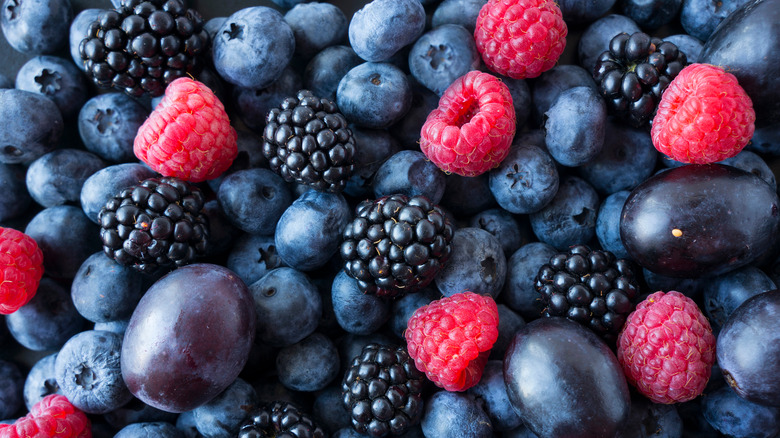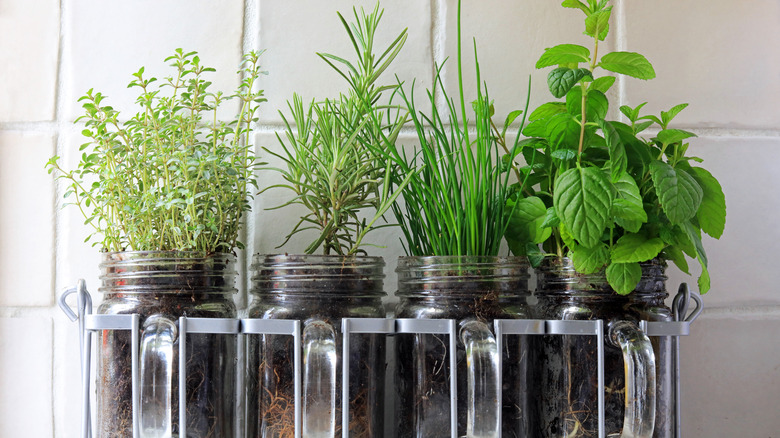How To Spruce Up Your Diet For Spring
Don't we all sort of feel reborn when the frost melts? Even the term "spring cleaning" illustrates the sort of "out with the old, in with the new" spirit that seems to come naturally as the dark days begin to brighten.
More than some kooky old tradition, this call for clearing out might come from a cellular level. A study sponsored by the National Institute of Mental Health (NIMH) found that because nights are longer in the winter, many of us produce more melatonin than we do in sunnier months. This can cause us to feel more sluggish than usual. But as the weather warms and the sun pushes the moon aside, many of us begin to feel lighter. We may clean up the house and the yard, and we may yearn for foods that won't require as much heat to digest (per BBC). If you're looking to give your diet a little sprucing up for spring, here are a few enjoyable ways to do it.
Eat in season by shopping locally
The Agricultural Development and Advisory Service defines the seasonality of food as the time of year when a particular crop is at its pinnacle, either in harvest or in flavor. Eating in season is easy to do in the spring and summer because there's no shortage of fresh, yummy options. The Seasonal Food Guide reports that not only is food tastier when eaten in season, but because they needn't be transported over long distances, they are also fresher. Adding on to that, fruits and vegetables that get the chance to ripen on their respective parent plants pack more nutrients into each bite — a perk out-of-season produce miss out on, as they're harvested prematurely to make up for travel time.
To see what's being grown fresh in your area, you need only take a walk through your local farmers' market. Not only will you get fresher and less expensive produce, but you get the opportunity to ask questions about where your food comes from with the added bonus of supporting your local economy!
It's berry important to eat natural sugars
Spring might mean that the days of holing up on the couch and eating an entire family-size bag of M&Ms just to feel something are over. But that doesn't mean you can't get your sugar fix elsewhere. Dr. Donald D. Hensrud, medical director for the Mayo Clinic Healthy Living Program, told Mindbodygreen that trading sugary snacks in for fresh fruit is an excellent way to increase your micronutrients.
Consumer Reports recommends berries in particular, as they're loaded with antioxidants, fiber, and nutrients that support brain function and help to uphold a healthy weight. In many places, late spring is the best time for berries, so now is the time to pick some up (or pick some yourself, if a local farm allows) and toss them in your smoothie, add them to your breakfast spread, or have a few raspberries with cream after dinner for a light and satisfying spring dessert.
Grow your own family of herbs
What says "spring has sprouted" more than your very own herb garden? City dwellers, do not be deterred! You can create a whole witchy wall of herbs with just a few old soda cans, seeds, and a sunny window sill. And you certainly should!
Using your own plant babies in your home cooking can benefit your physical health in big ways. Tufts University notes that using herbs and spices to flavor your food can significantly reduce the amount of salt you cook with and consume, which lowers your risk of high blood pressure, heart disease, and stroke.
More than giving salt the boot, herbs have been used for centuries for medicinal properties. In ancient traditions like Ayurveda, cooking and eating food is an integral part of preventing and treating illness and disease, as well as bringing balance to the mind and body (per Organic India). For example, rosemary has been used to stimulate and regulate menstruation, aid in digestion, enhance the immune system, and protect the liver (per Traditional Roots Institute).
Veggies for breakfast
While some mornings it's lovely to have a flaky pastry with your cafe au lait and pretend you're in a Parisian pâtisserie, it's probably best to keep that in the category of "sometimes treats." Breakfast, according to the Cleveland Clinic, gives your body the fuel it needs to function throughout the day. So why not give it something that will help it perform to the best of its ability?
When speaking with Today's Dietitian, registered dietitian and author Sharon Palmer advocates for breakfast veggies, claiming that many people don't get their first vegetable of the day until they sit down to eat dinner. At that point, she astutely points out, it is significantly less likely you're going to get your daily recommended amount of greens. Eating vegetables first thing in the morning gets you on track to consume all the vegetables your body needs in a day, and it also means your cells get the benefits of all those nutrients during your waking hours.
Bottoms up
Staying hydrated all year round is essential to having good health. According to Harvard Health, water does the most — from delivering nutrients to your cells, keeping your organs working properly, and lubricating your joints, to improving your sleep, cognition, and mood. As the weather warms up and we start to produce more sweat, it's always wise to up your water intake. But did you know drinking more water can also help to keep unhealthy eating habits at bay?
The Department of Veteran Affairs stresses the impact that drinking a glass of water when we feel hungry can have on the way we eat. For many of us, the difference between feeling hungry and being thirsty can be so subtle that we give our bodies food when it really just wants some water. Drinking water when we feel hungry can help us to maintain a healthy weight by curbing overeating.






